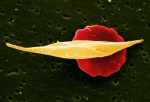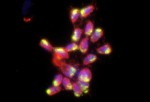Health & Medicine - Posted by Cynthia Lee-McGill on Friday, October 26, 2012 11:56 - 2 Comments
Sea sponge chemical fixes cystic fibrosis defect

Researchers have identified a new molecule in a marine sponge that repairs a defect known to cause most cases of cystic fibrosis (CF), one of the most common fatal genetic diseases. (Credit: "sea sponges" via Shutterstock)
MCGILL (CAN) — A chemical from a marine sponge found in the South Pacific Ocean restores function in a defective protein that causes cystic fibrosis, a fatal genetic disease.
“We identified and isolated in sea sponges a compound called latonduine and developed a method to determine its site of action,” says David Thomas, chair of the department of biochemistry at McGill University and Canada Research Chair in Molecular Genetics. The team examined 720 marine extracts from South Pacific sponges to identify latonduine as the active molecule.
For the study published in the journal Chemistry and Biology, Thomas and colleagues built upon their ongoing research, which centers on treating the most common mutant form of the cystic fibrosis transmembrane conductance regulator (CFTR) to correct the basic defect that causes most CF cases.
This membrane protein is involved in ion and water transport across cells that line the airways and other organs. In people with CF, the mutant protein does not fold correctly and is retained within the cell instead of reaching its normal location at the cell surface. CF results from this failure to localize correctly in the cell.
The new compound, which had no previous known biological function, becomes a novel candidate for further CF research. “In the past, people have looked under the streetlight for lost keys, but we choose to search for our keys using a flashlight in other untapped areas,” says Graeme Carlile, a McGill research associate and co-author.
Now that lantonduines have been shown to correct the most common CFTR mutant, work can begin on identifying the critical pathways that mediate this correction with a view to advancing treatment of CF.
“As a disease with roughly 80,000 patients worldwide, CF has not been a priority for major pharmaceutical companies, although this is changing with the recent approval of a drug for treating a less common CFTR mutant,” Thomas says.
The Canadian Institutes of Health Research, the Natural Sciences and Engineering Research Council of Canada, Cystic Fibrosis Canada, the Canada Foundation for Innovation, and the Canada Research Chairs program funded the work.
Source: McGill University
Please wait
2 Comments
derrick williams
derrick williams
whats the name of this sponge
























what is the name of this type of sponge